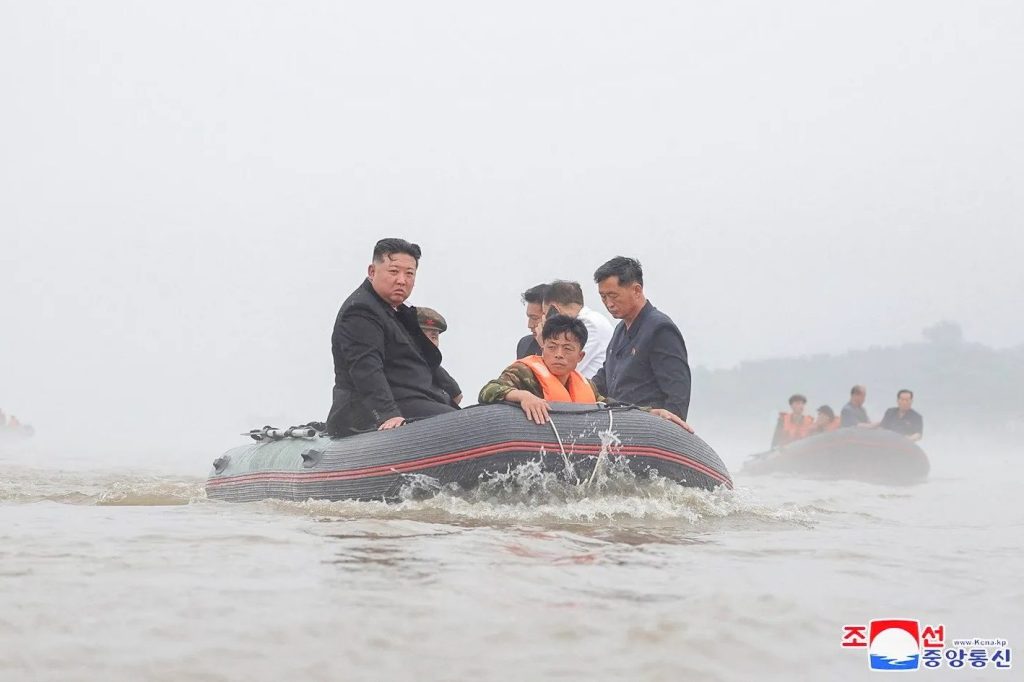The sight of a grimacing Kim Jong-un on board an inflatable rubber dinghy is not what one would expect from the leader of a country which has repeatedly threatened to “annihilate” the United States. As floods ravage across provinces along North Korea’s border with China, the North Korean leader has leapt upon the occasion to berate his officials for mismanagement, reinforce state ideology and emphasize that under the protection of his supreme leadership, all will — eventually — be well.
While the devastating flash floods of July and early August primarily affected areas in the northern part of the country, the consequences have been felt across the hermit kingdom. North Korean state media has been reluctant to disclose the scale of the damage and causalities, merely saying how at least 7,500 acres of agricultural fields were affected and that the army had rescued over 4,000 displaced people from flood-stricken northern provinces. The true extent of damage and number of lives affected are likely far greater, despite Kim accusing South Korean media of launching a smear campaign against the north, for claiming that the floods had killed over 1,500 people.
History shows us how the Kim regime seizes times of crisis
The ruling regime ordered over 15,000 people living in affected areas to be transported to Pyongyang, in what, for many, would have been their first visit to the country’s capital. State media proclaimed that these flood victims were “having a good time… under the care of the motherly party.” Yet, given the country’s poor infrastructure, efforts to reconstruct the flood-hit areas will likely exceed the estimated three month-timeline outlined by Kim Jong-un. What is more, the severity of the flooding may also affect North Korea’s foreign relations. One of the likely-affected areas, Songgan County, is home to several munitions factories manufacturing missiles, which North Korea has been sending to Russia to use in its war against Ukraine.
North Korea has been no stranger to meteorological disasters, with economic mismanagement and paltry infrastructural development worsening casualties and hampering effective post-disaster responses. The notorious famine in the mid-to-late 1990s — what the regime continues to term the “Arduous March” — claimed the lives of between 2 and 3.5 million people and was a toxic combination of chronic food shortages and severe economic catastrophes in the wake of the end of the Cold War, coupled with ongoing cycles of floods and drought.
Although the country did accept international assistance in the 1990s, North Korea’s past responses to crises — meteorological or otherwise — offers a useful indication as to how it will continue to handle the effects of the recent floods. Given Pyongyang’s retreat to isolationism, the fact that Kim Jong-un refused humanitarian aid, even from North Korea’s now-significant partner of Russia, was not unforeseen, despite the significant advancement in relations between Moscow and Pyongyang over the past year. Putin has showered his North Korean counterpart with two luxury Russian-made Aurus sedans, not to mention the military technology, food, and cash that Russia has been providing in exchange for North Korean artillery and missiles. Only this past month, Russia agreed to provide over 450 goats to North Korea, which North Korea duly accepted, as a means of bolstering the production of dairy products for children, in what was perhaps a not-so-tacit admission of the need to combat malnutrition. Yet, only three years ago, during another crisis, namely a pandemic, North Korea infamously rejected nearly 3 million Covid-19 vaccines from the multilateral Covax initiative, instead saying that no cases of the virus had been found within the country.
History tells us how during times of crisis, the Kim regime seizes the chance to reinforce the benevolence of the state leader and call upon the people to strengthen belief in the state ideology of juche. Juche, or self-reliance, has been the country’s official ideology since the early 1950s, and has long-been framed in opposition to sadaejuui, or reliance upon great powers, the latter in which North Korea has ceaselessly accused South Korea of engaging, given its alliance with the United States.
At a time when the state’s ideological control over the North Korean population is becoming increasingly stringent, the Kim regime is unlikely to shy away from these tried-and-tested tactics. In the aftermath of the latest floods, Kim warned that “irresponsible” officials would be punished for failing to engage in flood mitigation practices, much like how earlier this year, he sacked officials for poor and inefficient construction work in re-building the town of Samjiyon, which is due to reopen to tourists later this year. Moreover, Kim Jong-un’s visits to victims in flood-stricken areas offered a useful occasion not just to see the sheer scale of the damage, but to reinforce the need for complete loyalty to him and his regime. The North Korean leader reassured flood victims that only through continued loyalty to the Workers’ Party of Korea would they “enjoy eternal happiness… without any fear of natural disasters.”
Even North Koreans know that loyalty to the Kim regime is not going to influence the weather. But what these recent crises show is just how desperate the Kim regime is to maintain its own survival. Taking a leaf out of the dictator’s playbook, Kim Jong-un’s logic is clear: if in doubt, blame others, even those with whom you work, so long as doing so ensures that you keep hold of power.
This article was originally published on The Spectator’s UK website.

























